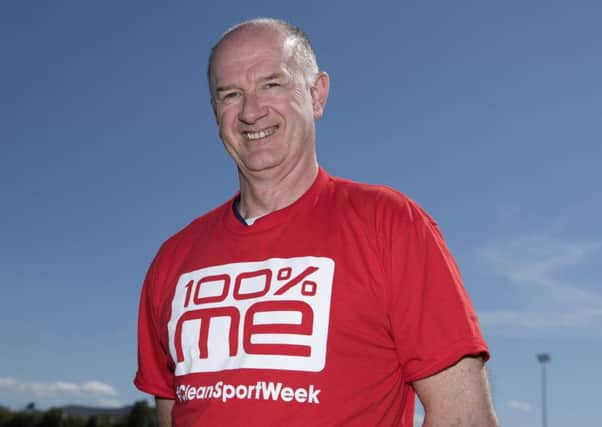SRU doctor warns of dangers in supplement use


The long-serving Scotland and Lions team doctor was speaking at the start of UK Anti-Doping’s Clean Sport Week, which is backed by the SRU, and aims to raise education and awareness on the issues surrounding banned substances.
Dr Robson is a passionate advocate of the campaign’s “100 per cent me” motto which emphasises personal responsibility for what an athlete puts in their body. This second Clean Sport Week is taking a strong focus on supplement use and image enhancing culture.
Advertisement
Hide AdAdvertisement
Hide AdWhile the blatant use of steroids, which affected Scottish rugby this season with the banning of Marr prop Andrew Acton, remains the most obvious form of cheating, clarifying the often grey area of supplement use is something that Dr Robson is keen to broadcast to everyone involved with rugby throughout the country.
He said: “We’ve had an Under-18s no supplements policy for several years now because we believe the right way for everybody in actual fact is just eating.
“Eating normal food stuffs but getting the diet tailored to the work you’re doing. You can do it if you put your mind to it.
“For me there is no reason for under-18s to use supplements. Over 18s... there may be legitimate areas where there might need to be some supplement. But what we’re saying is that the problem with supplements are that they’re often not made in high-grade pharmaceutical facilities and there is always the chance of cross-contamination.
Advertisement
Hide AdAdvertisement
Hide Ad“The educational message there is you’ve got to assess the need, assess the risk and be aware of the consequences. If you are going to take a supplement then for goodness sake go on to informed-sport.com, where you can drill down to the batch number and can see if that has been tested.
“But even that does not come with a 100 per cent guarantee so people are taking a risk.”
Dr Robson admits that some players at the elite professional level do use supplements, but stressed that even then heightened vigilance is needed.
“They [pros] take certain forms of supplements, which are heavily regulated,” he said. “We make sure that we only supply supplements which have gone through rigorous testing. But we still reiterate the message that, at the end of the day it is your issue, you are 100 per cent liable.”
Advertisement
Hide AdAdvertisement
Hide AdDr Robson is confident that there is no doping “culture” in Scottish rugby but accepts the temptation to cheat is always there. His message is that the SRU is beefing up its intelligence-led and random testing programme and that the chances of being caught are increasing all the time.
“I don’t think there is the culture [in Scottish rugby] but people can always be tempted into taking shortcuts and that’s what we are saying this week,” he explained.
“If they do take a shortcut the chances are they will be found out. And we need to get the message out that there is a heavy toll. Steroids can cause all sorts of damage to your heart, liver and personality.
“If caught there is the social stigma, a standard four-year ban means your rugby career can be irreparably harmed, it can go on your employment record. I honestly don’t know why anyone would take the chance.”
Advertisement
Hide AdAdvertisement
Hide AdWhile straying into the realms of societal issues, recreational drug use is another topic which the governing body is investing more attention to.
The SRU’s medical services manager Richard Wood said: “Something like cocaine is banned in competition but has been downgraded to not being banned out of competition [by WADA]. As part of the illicit drugs policy we are developing at the moment, players won’t be allowed to take that in our sport [Scottish Rugby], regardless.
“Down the lower leagues, potentially, recreational drugs are more of a problem than supplemental drugs but we can’t honestly say how big an issue it is. We’re taking steps to find if it is an issue below Premiership and National League club level.
“We have an increased pot of funding from the Board and can now say to UKAD that we want these leagues tested. At the national cup finals day, sevens, the women’s leagues and throughout the season there is going to be more testing so if people are using recreational drugs, whether it’s cocaine or cannabis, they need to know going forward there is a greater chance of them getting tested.”
Advertisement
Hide AdAdvertisement
Hide Ad• Clean Sport Week is a partnership campaign between UK Anti-Doping (UKAD), national governing bodies and the wider British sporting family, which provides a platform to celebrate clean athletes and their success, and promote the work of the anti-doping community in the fight for clean sport. Go to www.ukad.org.uk/cleansportweek2 or join in the conversation using #CleanSportWeek